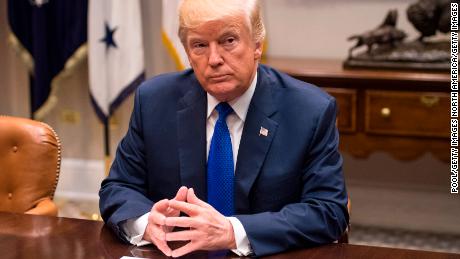
Washington – White House press secretary Sarah Sanders defended President Donald Trump’s decision to retweet a series of anti-Muslim videos from a British far-right account on Wednesday morning, telling reporters he circulated them to start a conversation about border security and immigration.
Sanders also said she doesn’t know how the videos got in front of Trump and wouldn’t say whether they were real.
“Whether it is a real video, the threat is real,” Sanders told a small group of reporters after appearing on Fox News. “That is what the President is talking about, that is what the President is focused on is dealing with those real threats, and those are real no matter how you look at it.”
When pressed on whether it matters if the video is real, Sanders said reporters were “focusing on the wrong thing.”
“The threat is real,” she said, later adding that “the threat needs to be addressed. The threat has to be talked about and that is what the President is doing in bringing that up.”
The retweets have once again thrust his administration into conversation about anti-Muslim bias as the courts are weighing the legality of Trump’s travel ban and raised questions about how content swirling on the Internet ends up on the President’s powerful Twitter account.
“I think his goal is to promote strong borders and strong national security,” Sanders said. She later added that she and the reporters were talking about border security so Trump’s tweets were “accomplishing exactly that.”
Trump’s account retweeted the tweets early on Wednesday morning. The messages from Jayda Fransen, the deputy leader of Britain First, purport to show Muslims assaulting people and smashing a statue of the Virgin Mary.
A spokesperson for British Prime Minister Theresa May said Wednesday that Trump was “wrong” to retweet anti-Muslim videos, adding that Fransen’s organization “seeks to divide communities through their use of hateful narratives which peddle lies and stoke tensions.”
Sanders said she was not aware of any concerns from Trump that his retweets could damage his relationship with May.
“I think that both Theresa May and a lot of the other world leaders across the world know that these are real threats that we have to talk about, I think Europe has seen that a lot first hand,” Sanders said before the statement from May’s spokesperson was widely public.
Sanders added she was unaware of how the videos got in front of Trump but the process generally hinges on Dan Scavino, Trump’s director of social media and one of the few aides with the keys to Trump’s powerful social media platforms.
Scavino’s history with Trump dates back years. Before running social media for his campaign — where he was once brought on stage and lauded by Trump — Scavino was caddie at Briar Hall Country Club in New York’s Hudson Valley, a course Trump would soon buy. Scavino worked his way up from caddie to general manager and then joined Trump’s campaign.
Earlier this year, Scavino told CNN that he had had full control of @realDonaldTrump, the President’s much-watched Twitter account, since the businessman-turned-politician started campaigning in 2015.
When Trump doesn’t personally tweet or retweet a message, Scavino said, the social media director will “execute” a tweet for him. Scavino added that he will go through tweets with Trump before they are sent out, including “videos, photos, stories” that end up on his account.
At times, though, the line between what Scavino and Trump tweets is thin. Last month, both the social media director and the President slammed NBC and CNN with the exact same language at the exact same time.
It is unclear exactly how Scavino or Trump first saw Fransen’s videos, but one intersection could be Ann Coulter, a conservative pundit with anti-Islam views who is one of the 45-accounts Trump follows on Twitter.
Coulter retweeted one of Fransen’s videos some time between 6 p.m. ET and midnight on Tuesday night.
Scavino did not respond to a series of questions from CNN on Wednesday.
The origin of these tweets is significant because Trump’s messages — from the benign to the inflammatory — have an impact on how the United States is viewed around the world and how policy is implemented.
For example, Wednesday’s retweets could imperial a key Trump goal: Banning immigration from eight countries, including majority Muslim nations like Chad, Iran, Libya, Syria, Somalia and Yemen.
The Supreme Court is considering whether to allow the third version of Trump’s travel ban to go into effect. Government lawyers have argued that the policy is not a “Muslim ban,” despite Trump’s call for a “total and complete shutdown of Muslims entering the United States” during the 2016 campaign.
Lawyers arguing against the ban, though, have said that said government lawyers can’t “divorce the Proclamation from its history and context,” pointing to the President’s part statements which they argue color his views on a travel ban.
Neal Katyal, one of the lawyers opposing the ban, responded to Trump’s retweets with a simple, “Thanks! See you in court next week.”
Trump is no stranger to anti-Islam comments that has roiled his supporters and critics alike.
During the 2016 election, Trump told CNN that he believes “Islam hates us,” a comment that rankled some Republicans.
“There’s something there that — there’s a tremendous hatred there,” Trump said. “There’s a tremendous hatred. We have to get to the bottom of it.
There’s an unbelievable hatred of us.”
As reported by CNN
